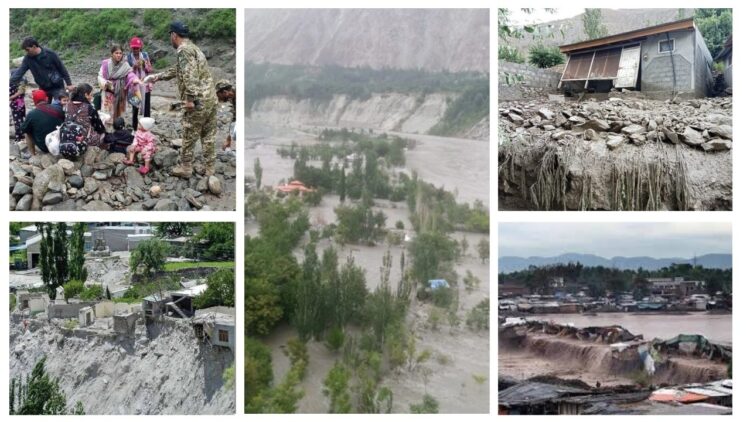GILGIT-BALTISTAN; The mountainous region of Gilgit-Baltistan is facing one of its most severe climate change impacts in recent years, as torrential rains and cloudbursts trigger flash floods across all ten districts. Authorities report multiple casualties and the destruction of property worth millions of rupees, with the disaster worsening by the hour.
In Skardu, powerful floodwaters from the Barqay Nala and Rgyoul areas have swept into villages near the airport, forcing residents to flee. The road leading to Deosai has been severely damaged at Sadpara due to landslides and flash floods, leaving tourists and locals stranded. Communication routes in Shigar and Kharmang have also been cut off, while heavy downpours continue unabated. The city of Skardu is without electricity and water, further deepening the crisis. The vital Karakoram Highway has been closed due to landslides, disrupting regional connectivity.
In Ghizer district, reports from Khulti indicate fatalities from sudden flood surges, along with significant property damage. Multiple areas, including Khulti, Dain, and Yasin, have been devastated, with seven people — including a young girl — reported missing. In Chilas, local streams have swelled dangerously, threatening nearby settlements. Witnesses reported clouds of dust over Thak’s mountains near Babusar before the rains began, a sign of shifting weather patterns.
Local officials and climate experts warn that such disasters are becoming more frequent due to accelerated glacial melt and unpredictable weather linked to global climate change. Gilgit-Baltistan, home to some of the world’s largest glaciers outside the polar regions, has seen rising incidents of glacial lake outburst floods (GLOFs) and flash floods over the past decade.
Rescue operations are ongoing, but authorities fear that continued heavy rainfall could worsen the situation. The provincial disaster management authority has urged residents in vulnerable areas to move to safer ground immediately.





































































